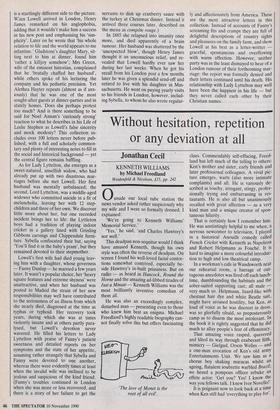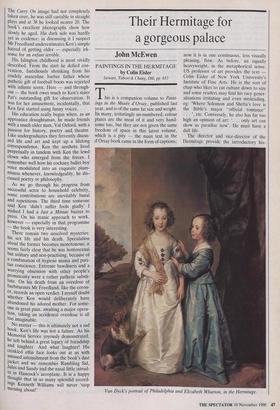Without hesitation, repetition or any deviation at all
Jonathan Cecil
KENNETH WILLIAMS by Michael Freedland
Weidenfeld & Nicolson, f15, pp. 242
0 utside our local tube station the news vendor asked rather suspiciously why my wife and I were so formally dressed. I explained: `We're going to Kenneth Williams' Memorial Service.'
`Yes,' he said, 'and Charles Hawtrey's not well.'
This deadpan non-sequitur would I think have amused Kenneth, though his own style was often the reverse of deadpan. On screen I found his well-loved facial contor- tions somewhat contrived, especially be- side Hawtrey's in-built prissiness. But on radio — as heard in Hancock, Round the Home and the amazing ad-libbed tirades of Just a Minute — Kenneth Williams was the most brilliantly inventive comedian of them all.
He was also an exceedingly complex, disturbed man — presenting even to those who knew him best an enigma. Michael Freedland's highly readable biography can- not finally solve this but offers fascinating `The love of Monet is the root of all evil'. clues. Commendably self-effacing, Freed- land has left much of the telling to others: Ken's mother and sister, early friends and later professional colleagues. A vivid pic- ture emerges, warts (also more intimate complaints) and all. He is variously de- scribed as touchy, arrogant, stingy, profes- sionally trying and embarrassing in res- taurants. He is also all but unanimously recalled with great affection — as a very kind man and a unique creator of spon- taneous hilarity.
That is certainly how I remember him. He was unstintingly helpful to me when, a nervous newcomer to television, I played in a historical Anouilh comedy called French Cricket with Kenneth as Napoleon and Robert Helpmann as Fouche. It is hard to imagine a more colourful introduc- tion to high and low theatrical camp.
In a workman's cafe in Wandsworth near our rehearsal room, a barrage of out- rageous anecdotes was fired off each lunch- time, dumbfounding the habitues and the sober-suited supporting cast; all male very much so. Helpmann, lizard-like with chestnut hair dye and white Beatle suit, might have aroused hostility, but Ken, as loud of voice as he was discreet in dress, was so gleefully ribald, so preposterously camp as to disarm the most intolerant. In the book it is rightly suggested that he did much to allay people's fear of effeminacy. That amazing voice rasped, quavered and lilted its way through exuberant filth, mimicry — Gielgud, Orson Welles — and a one-man evocation of Ken's old army Entertainments Unit. We saw him as a chorus boy shaking maracas whilst an ageing, flatulent soubrette warbled Brazil; we heard a pompous officer rebuke an effete actor: 'Get you? Yes! I know the way you fellows talk. I knew Ivor Novello! It is poignant now to look back at a time when Ken still had 'everything to play for'. The Carry On image had not completely taken over, he was still castable in straight plays and at 38 he looked nearer 20. The book's excellent photographs show how slowly he aged. His dark side was hardly yet in evidence: in discussing it I suspect Mr Freedland underestimates Ken's simple hatred of getting older — especially irk- some for an enfant terrible.
His Islington childhood is most vividly described. From the start he defied con- vention, fastidiously shrinking from his crudely masculine barber father whose pathetic gift of football boots was rejected with infinite scorn. Here — and through-
out — the book owes much to Ken's sister Pat's outstanding gift for observation. It was for her amusement, incidentally, that Ken first started using funny voices.
His education really began when, as an apprentice draughtsman, he made friends with a much older man, Val Orford, with a passion for history, poetry and, theatre. Like undergraduates they fervently discus- sed life and art and kept up a lifelong correspondence. Ken the aesthete lived
Perpetually in tandem with Ken the lewd clown who emerged from the forces. I.
remember well how his cockney ballet boy voice modulated into an exquisite plum- miness whenever, knowledgeably, he disc cussed poetry or philosophy.
As we go through his progress from successful actor to household celebrity, some contributions are inevitably banal and repetitious. The third time someone said Ken 'didn't suffer fools gladly' I
wished I had a Just a Minute buzzer to press. On his manic approach to work, however — especially in that. programme — the book is very interesting.
There remain two unsolved mysteries: his sex life and his death. Speculation about the former becomes monotonous: it seems fairly clear that he was homosexual but solitary and non-practising, because of a combination of hygiene mania and puri- tan conscience. Extreme bawdiness and a worrying obsession with other people's Promiscuity were a rather pathetic substi- tute. On his death from an overdose of barbiturates Mr Freedland, like the coron- er, records an open verdict. I myself doubt whether Ken would deliberately have abandoned his adored mother. For some- one in great pain, awaiting a major opera- tion, taking an accidental overdose is all too imaginable. No matter — this is ultimately not a sad book. Ken's life was not a failure. As his Memorial Service joyously demonstrated, he left behind a great legacy of friendship and laughter. And what laughter! His crinkled elfin face looks out at us with amused astonishment from the book's dust jacket and we remember Rambling Sid, Jules and Sandy and the nasal little intrud- er in Hancock's aeroplane. It is a happy thought that in so many splendid record- ings Kenneth Williams will never 'stop messing about!'



































































 Previous page
Previous page